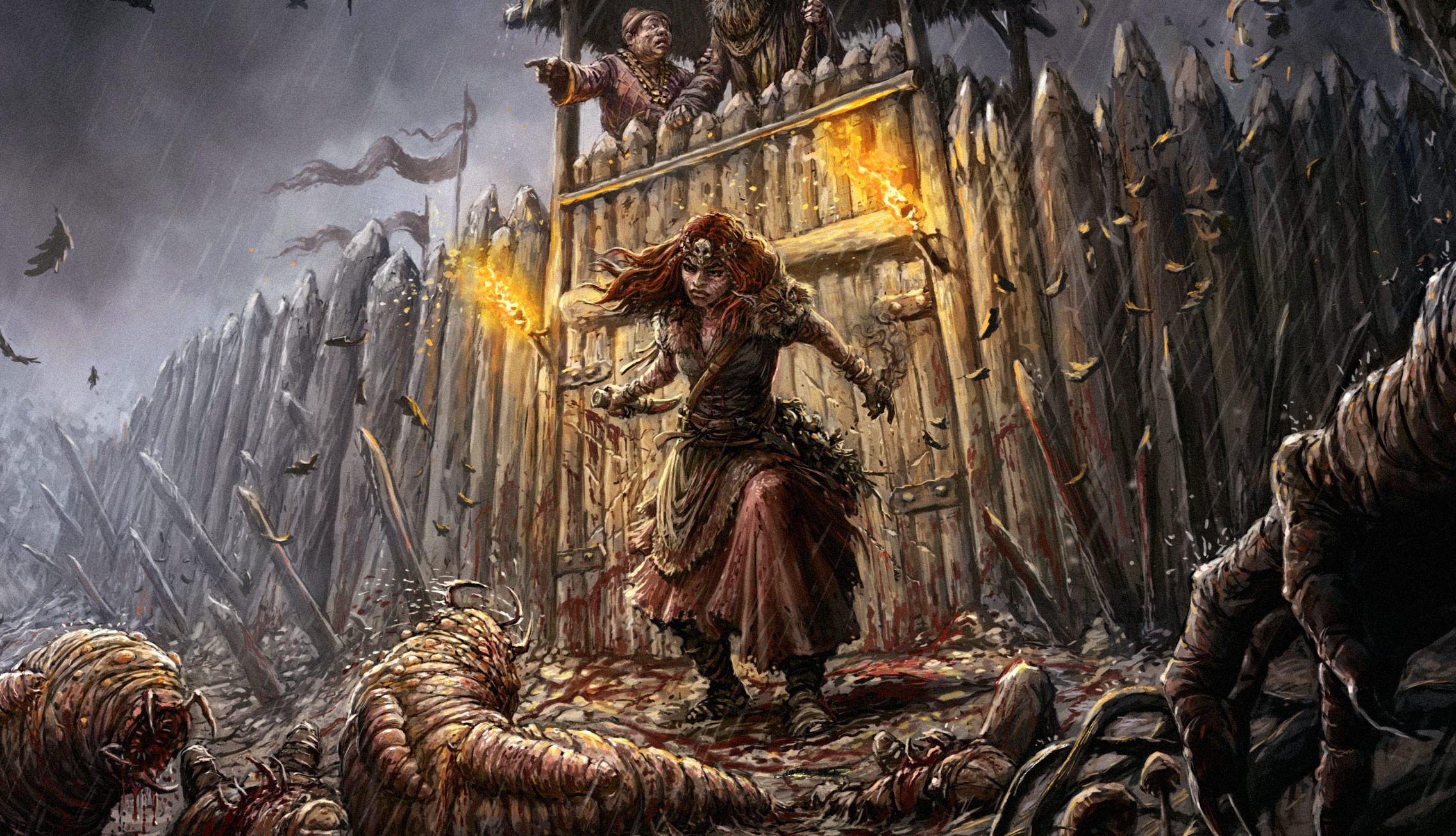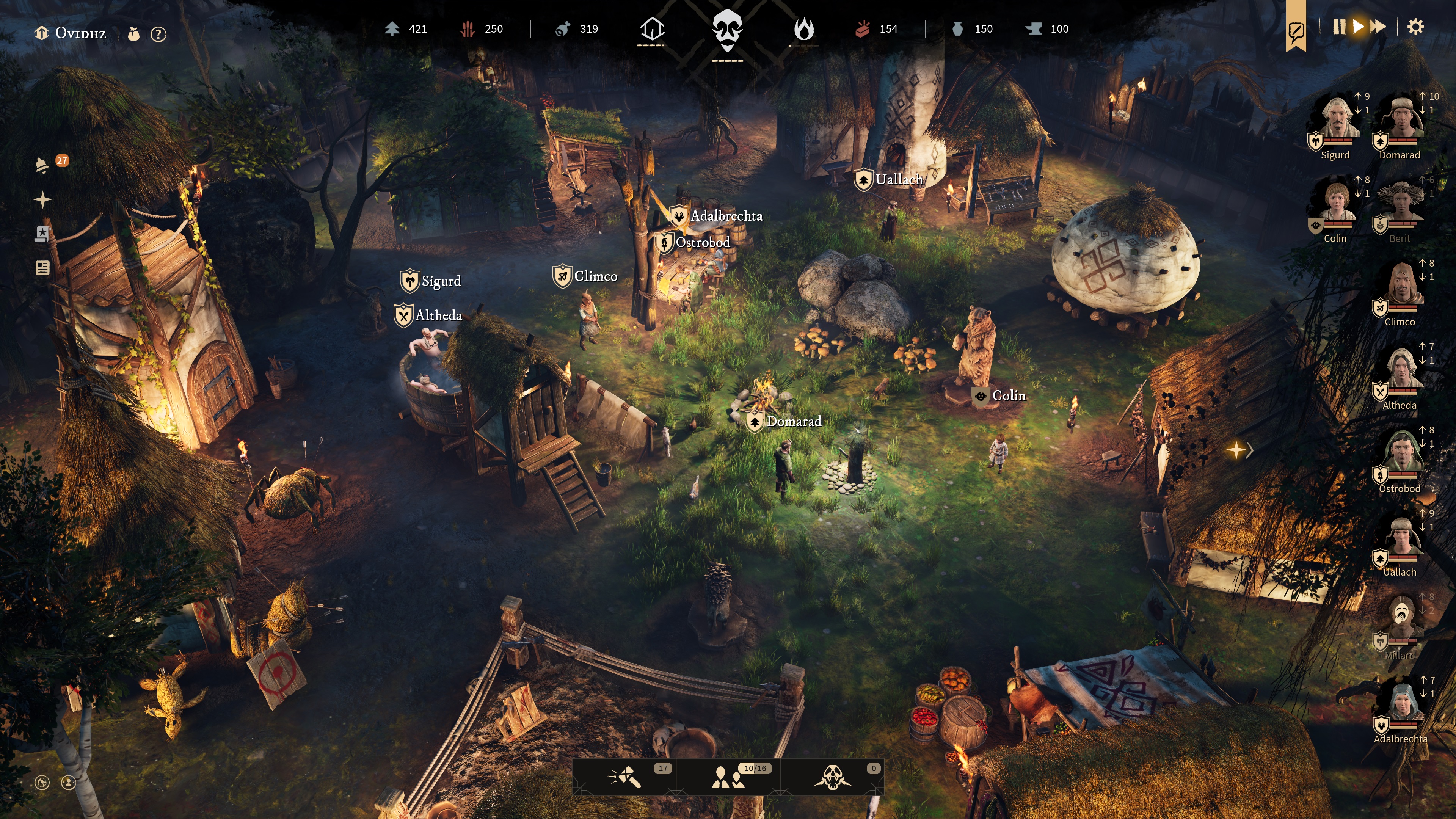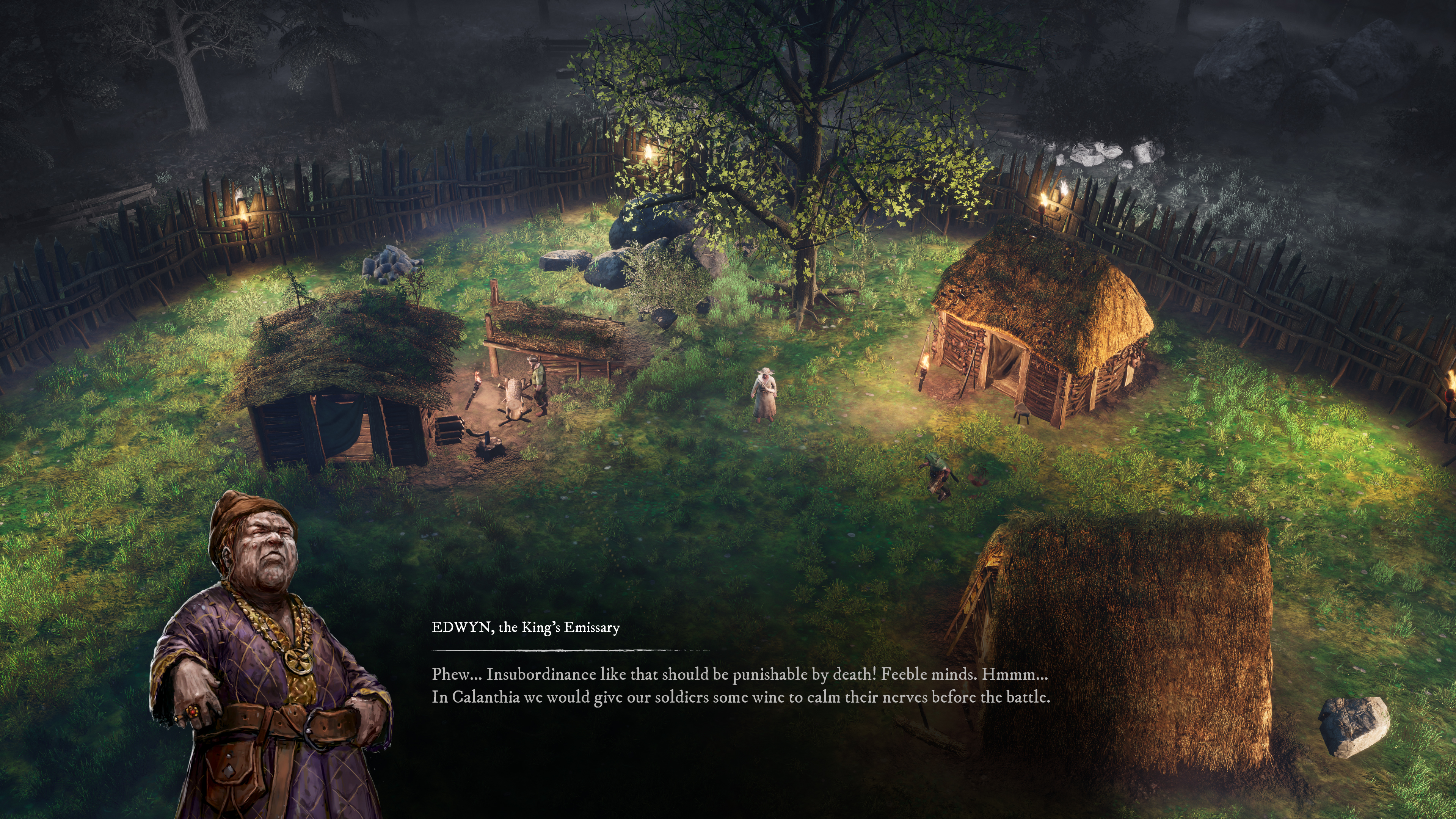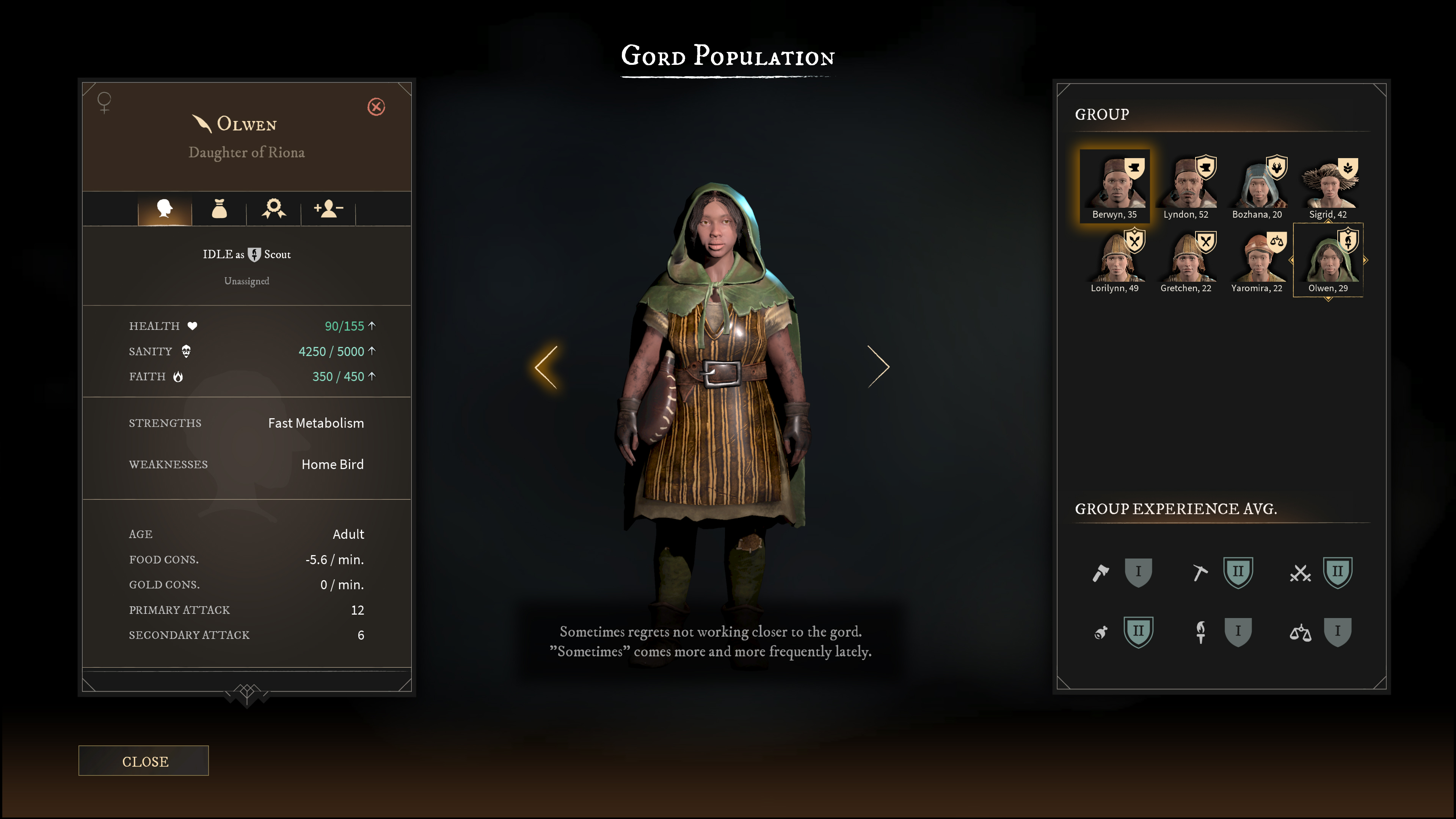This dark horror city builder is like being a mayor in The Witcher
In Gord's wonderfully grim, Slavic style, sacrificing your children to an ancient swamp horror is par for the course.

Gord sets out its stall pretty quickly. Within a few minutes, I'm building my first settlement, starting with the walls—to keep the dark things out. Within ten I'm fussing about which jobs I want to give each of my settlers, and already antsy for more wood and reeds to construct new buildings. Within half an hour, I'm sacrificing one of the colony's children to an ancient swamp horror.
Combining elements of city builder, real-time strategy, survival, RPG, and horror, Gord is most easily understood as a game about what it would be like to try and keep a town full of villagers alive in the middle of one of those horrible, monster-infested forests from The Witcher. Beset on all sides by vicious beasts and deformed creatures, risking life and limb just to gather some mushrooms or a bundle of reeds, your small gang of townsfolk look to you to protect not just their lives, but their sanity.

The dragon is a distorted, surreal creature, like something out of a horrible picture book that would have given me nightmares as a kid.
Inspired by Slavic folklore, Gord's world is thick with atmosphere—all of it bleak and horrific. As I set up my first town (or "gord"—the game is named for a specific kind of medieval Slavic fort), I'm nervous even just sending villagers to chop down trees. Whenever they're outside the safety of the walls, it feels like they could fall into danger at any moment. Grim cutscenes setting up a story about a cruel imperial bureaucrat forcing the cautious locals into peril further adds to the sense of hopelessness, especially when bizarre creatures of myth—including a demonic dragon with an entourage of wailing ghosts—make their presence known.
It's a shame, though, that that atmosphere is often punctured when a character opens their mouth. Much of the dialogue is disappointingly generic fantasy fluff, and many of the voice actors give bland deliveries in flat American accents that feel at odds with the tone and setting. Any mystique around the strange forest witch I encounter about an hour into my journey is lost when she starts expositing about demons in what sounds like the default female human voice from a 2000s RPG.
The art-style, at least, fits the bill perfectly. The dragon is a distorted, surreal creature, like something out of a horrible picture book that would have given me nightmares as a kid—it's a really unique and memorable design. And that ancient swamp horror is as wonderfully disgusting as you'd expect, an oozing, diseased behemoth that manages to look simultaneously tragic and terrifying.
Creatures like him are the sort of dark gods of the forest. You can fight them, but the witch warns it will be a near-impossible battle—given my "army" consists of 10 flea-bitten peasants, I don't fancy risking it. It's rather easier to bargain with them, leading me to that discrete bit of child sacrifice, feeding a young 'un into his gaping maw. Listen, sometimes you have to make choices for the greater good, even if that greater good is just getting to the next bit of horrible wilderness to build another gord.
Gord help us

Each villager has their own traits and aptitudes that affect how they perform and incline them towards certain jobs.
When you're not hanging out with witches and demons, the day-to-day running of your settlement is the focus. The basics are fairly simple—you build buildings that allow you to assign jobs to your small band of peasants, such as woodcutter or forager, and they automatically head out to do them. During my demo I also got to make some into scouts, who can be set to patrol the local area or controlled directly to explore, and warriors, who fare much better in the RTS-like combat than unarmed townsfolk.
Keep up to date with the most important stories and the best deals, as picked by the PC Gamer team.
Beneath that simple surface, however, there's a lot of depth. Each villager has their own traits and aptitudes that affect how they perform and incline them towards certain jobs—such as a bonus in melee combat, or moving faster through forest. They also each have health and sanity to track, and must be manually sent to recover when they get low—either receiving medicine at a "balia" (a kind of bathhouse) or drinking away their fears at the mead tent. While health is lost as you'd expect, when they get attacked in the woods, sanity seems to drain slowly but constantly while they're outside the settlement, so it's vital to keep an eye on everyone's mental state as you go.

The game very much expects you to micromanage like you're playing an RTS.
This moment to moment management is definitely more fiddly than I was hoping, however. Villagers feel like they have a bit less autonomy than they should—if you interrupt them in their work, say to move them away from danger or help construct a new building, they'll then just stand around waiting for further orders instead of returning to their main job. Keeping track of their abilities is awkward—I couldn't even figure out how to view their character sheet in-game, and ended up renaming them all to things like "Brawler" and "Reed Liker" between maps so I could remember who was who.
—clicking around the map so you can follow your scout's exploring at the same time as maximising efficiency in your base and keeping your warriors alive as they clear out a nest of spiders. There should be plenty of depth there for strategy fans, but for me the very hands-on approach feels a little at odds with the dark management sim premise. Stressing out about keeping my people safe is fun, worrying about whether I've left someone standing idle somewhere less so.
Still, the section I play is very early on, and things may very well click more for me as more systems are layered on. I'm certainly interested to see more of Gord's dark and strange world, and a little roughness around the edges is perhaps to be expected in a game that's experimenting so much with genre. I'll be watching with interest in the run up to launch, planned for later this summer.

Formerly the editor of PC Gamer magazine (and the dearly departed GamesMaster), Robin combines years of experience in games journalism with a lifelong love of PC gaming. First hypnotised by the light of the monitor as he muddled through Simon the Sorcerer on his uncle’s machine, he’s been a devotee ever since, devouring any RPG or strategy game to stumble into his path. Now he's channelling that devotion into filling this lovely website with features, news, reviews, and all of his hottest takes.

